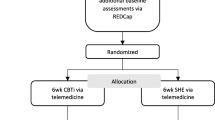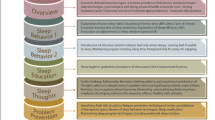Abstract
Purpose of Review
Persistence of insomnia during recovery from alcohol use disorders (AUD) is common and associated with drinking relapse and suicidal ideation. Therefore, insomnia intervention is often warranted for AUD patients. This review critically evaluates current literature on approaches to insomnia management in recovering AUD patients.
Recent Findings
Recent work has bolstered support for cognitive-behavioral therapy as the first-line intervention for insomnia in AUD patients, although more work is needed to determine its effects on drinking outcomes. Recent initial evidence suggests that CBT for insomnia delivered online improves insomnia and drinking outcomes. Finally, gabapentin is the most evidence-based medication for improving both sleep disturbance and drinking outcomes in AUD patients, but controlled studies are warranted on melatonin receptor agonists, which have low risk of abuse and could target identified circadian rhythm abnormalities in this population.
Summary
Ongoing monitoring and treatment of insomnia in AUD is frequently indicated, and several behavioral and pharmacological sleep-focused interventions have garnered initial empirical support. However, the evidence base for insomnia treatments in recovering AUD patients is limited, and future research is warranted to establish more definitely their effectiveness and predictors of insomnia and drinking outcomes.
Similar content being viewed by others
References
Chaudhary NS, Kampman KM, Kranzler HR, Grandner MA, Debbarma S, Chakravorty S. Insomnia in alcohol dependent subjects is associated with greater psychosocial problem severity. Addict Behav. 2015;50:165–72.
Wallen GR, Brooks MAT, Whiting MB, Clark R, Krumlauf MMC, Yang L, et al. The prevalence of sleep disturbance in alcoholics admitted for treatment: a target for chronic disease management. Family & community health. 2014;37(4):288.
Zhabenko N, Wojnar M, Brower KJ. Prevalence and correlates of insomnia in a Polish sample of alcohol-dependent patients. Alcohol Clin Exp Res. 2012;36(9):1600–7.
Brower KJ, Krentzman A, Robinson EA. Persistent insomnia, abstinence, and moderate drinking in alcohol-dependent individuals. Am J Addict. 2011;20(5):435–40.
Perney P, Rigole H, Mason B, Dematteis M, Lehert P. Measuring sleep disturbances in patients with alcohol use disorders: a short questionnaire suitable for routine practice. J Addict Med. 2015;9(1):25–30.
Brooks AT, Krumlauf MC, Whiting BP, Clark RJ, Wallen GR. Are you sleeping? Pilot comparison of self-reported and objective measures of sleep quality and duration in an inpatient alcoholism treatment program. Substance abuse: research and treatment. 2012;6:135.
Brower KJ, Krentzman A, Robinson EA. Persistent insomnia, abstinence, and moderate drinking in alcohol-dependent individuals. Am J Addict. 2011;20(5):435–40. doi:10.1111/j.1521-0391.2011.00152.x.
Kolla BP, Schneekloth T, Biernacka J, Mansukhani M, Geske J, Karpyak V, et al. The course of sleep disturbances in early alcohol recovery: an observational cohort study. Am J Addict. 2014;23(1):21–6.
Magnée EH, de Weert-van Oene GH, Wijdeveld TA, Coenen AM, de Jong CA. Sleep disturbances are associated with reduced health-related quality of life in patients with substance use disorders. Am J Addict. 2015;24(6):515–22.
Klimkiewicz A, Bohnert AS, Jakubczyk A, Ilgen MA, Wojnar M, Brower K. The association between insomnia and suicidal thoughts in adults treated for alcohol dependence in Poland. Drug Alcohol Depend. 2012;122(1):160–3.
Chakravorty S, Grandner MA, Mavandadi S, Perlis ML, Sturgis EB, Oslin DW. Suicidal ideation in veterans misusing alcohol: relationships with insomnia symptoms and sleep duration. Addict Behav. 2014;39(2):399–405.
Nadorff MR, Salem T, Winer ES, Lamis DA, Nazem S, Berman ME. Explaining alcohol use and suicide risk: a moderated mediation model involving insomnia symptoms and gender. Journal of clinical sleep medicine: JCSM: official publication of the American Academy of Sleep Medicine. 2014;10(12):1317.
Brower KJ, Aldrich MS, Hall JM. Polysomnographic and subjective sleep predictors of alcoholic relapse. Alcohol Clin Exp Res. 1998;22(8):1864–71.
Brower KJ, Aldrich MS, Robinson EA, Zucker RA, Greden JF. Insomnia, self-medication, and relapse to alcoholism. Am J Psychiatr. 2001;158(3):399–404.
Smith N, Hill R, Marshall J, Keaney F, Wanigaratne S. Sleep related beliefs and their association with alcohol relapse following residential alcohol detoxification treatment. Behav Cogn Psychother. 2014;42(05):593–604.
Darien I. International classification of sleep disorders. Darien: American Academy of Sleep Medicine; 2014.
Ebrahim IO, Shapiro CM, Williams AJ, Fenwick PB. Alcohol and sleep I: effects on normal sleep. Alcohol Clin Exp Res. 2013;37(4):539–49.
Brower KJ. Alcohol’s effects on sleep in alcoholics. Alcohol Res Health. 2001;25(2):110.
Thakkar MM, Sharma R, Sahota P. Alcohol disrupts sleep homeostasis. Alcohol. 2015;49(4):299–310.
Smith HL. The impact of alcohol consumption on sleep onset and REM latency: a meta-analytic study. 2016.
De Crescenzo F, Foti F, Ciabattini M, Del Giovane C, Watanabe N, Sañé Schepisi M et al. Comparative efficacy and acceptability of pharmacological treatments for insomnia in adults: a systematic review and network meta-analysis. The Cochrane Library. 2016.
Trauer JM, Qian MY, Doyle JS, Rajaratnam SM, Cunnington D. Cognitive behavioral therapy for chronic insomnia: a systematic review and meta-analysis. Ann Intern Med. 2015;163(3):191–204.
Qaseem A, Kansagara D, Forciea MA, Cooke M, Denberg TD. Management of chronic insomnia disorder in adults: a clinical practice guideline from the American College of Physicians. Annals of internal medicine. 2016.
Wu JQ, Appleman ER, Salazar RD, Ong JC. Cognitive behavioral therapy for insomnia comorbid with psychiatric and medical conditions: a meta-analysis. JAMA Intern Med. 2015;175(9):1461–72.
Geiger-Brown JM, Rogers VE, Liu W, Ludeman EM, Downton KD, Diaz-Abad M. Cognitive behavioral therapy in persons with comorbid insomnia: a meta-analysis. Sleep Med Rev. 2015;23:54–67.
Friedmann PD, Herman DS, Freedman S, Lemon SC, Ramsey S, Stein MD. Treatment of sleep disturbance in alcohol recovery: a national survey of addiction medicine physicians. J Addict Dis. 2003;22(2):91–103.
Irish LA, Kline CE, Gunn HE, Buysse DJ, Hall MH. The role of sleep hygiene in promoting public health: a review of empirical evidence. Sleep Med Rev. 2015;22:23–36.
Currie SR, Clark S, Hodgins DC, El-Guebaly N. Randomized controlled trial of brief cognitive–behavioural interventions for insomnia in recovering alcoholics. Addiction. 2004;99(9):1121–32.
Arnedt JT, Conroy DA, Armitage R, Brower KJ. Cognitive-behavioral therapy for insomnia in alcohol dependent patients: a randomized controlled pilot trial. Behav Res Ther. 2011;49(4):227–33.
Zhabenko O, Zhabenko N, Conroy DA, Chaban O, Oliinyk A, Frankova I et al. An open uncontrolled pilot trial of online cognitive-behavioral therapy for insomnia for Ukrainian alcohol-dependent patients. Innovations in the treatment of substance addiction. Springer; 2016. p. 165–81.
Greeff AP, Conradie WS. Use of progressive relaxation training for chronic alcoholics with insomnia. Psychol Rep. 1998;82(2):407–12.
van Maanen A, Meijer AM, van der Heijden KB, Oort FJ. The effects of light therapy on sleep problems: a systematic review and meta-analysis. Sleep Med Rev. 2016;29:52–62.
Schmitz M, Frey R, Pichler P, Röpke H, Anderer P, Saletu B, et al. Sleep quality during alcohol withdrawal with bright light therapy. Prog Neuro-Psychopharmacol Biol Psychiatry. 1997;21(6):965–77.
Kühlwein E, Hauger RL, Irwin MR. Abnormal nocturnal melatonin secretion and disordered sleep in abstinent alcoholics. Biol Psychiatry. 2003;54(12):1437–43.
Conroy DA, Hairston IS, Arnedt JT, Hoffmann RF, Armitage R, Brower KJ. Dim light melatonin onset in alcohol-dependent men and women compared with healthy controls. Chronobiol Int. 2012;29(1):35–42.
Schmitz MM, Sepandj A, Pichler PM, Rudas S. Disrupted melatonin-secretion during alcohol withdrawal. Prog Neuro-Psychopharmacol Biol Psychiatry. 1996;20(6):983–95.
Buscemi N, Vandermeer B, Friesen C, Bialy L, Tubman M, Ospina M, et al. The efficacy and safety of drug treatments for chronic insomnia in adults: a meta-analysis of RCTs. J Gen Intern Med. 2007;22(9):1335–50.
Griffiths RR, Johnson MW. Relative abuse liability of hypnotic drugs: a conceptual framework and algorithm for differentiating among compounds. J Clin Psychiatry. 2005;66(supplement 9):31–41.
Friedmann PD, Rose JS, Swift R, Stout RL, Millman RP, Stein MD. Trazodone for sleep disturbance after alcohol detoxification: a double-blind, placebo-controlled trial. Alcohol Clin Exp Res. 2008;32(9):1652–60.
Le Bon O, Murphy JR, Staner L, Hoffmann G, Kormoss N, Kentos M, et al. Double-blind, placebo-controlled study of the efficacy of trazodone in alcohol post-withdrawal syndrome: polysomnographic and clinical evaluations. J Clin Psychopharmacol. 2003;23(4):377–83.
Monnelly EP, LoCastro JS, Gagnon D, Young M, Fiore LD. Quetiapine versus trazodone in reducing rehospitalization for alcohol dependence: a large data-base study. J Addict Med. 2008;2(3):128–34.
Kolla BP, Schneekloth TD, Biernacka JM, Frye MA, Mansukhani MP, Hall-Flavin DK, et al. Trazodone and alcohol relapse: a retrospective study following residential treatment. Am J Addict. 2011;20(6):525–9.
Liappas J, Paparrigopoulos T, Tzavellas E, Rabavilas A. Mirtazapine and venlafaxine in the management of collateral psychopathology during alcohol detoxification. Prog Neuro-Psychopharmacol Biol Psychiatry. 2005;29(1):55–60.
Cornelius JR, Douaihy AB, Clark DB, Chung T, Wood DS, Daley D. Mirtazapine in comorbid major depression and alcohol dependence: an open-label trial. Journal of dual diagnosis. 2012;8(3):200–4.
Anton RF, Myrick H, Wright TM, Latham PK, Baros AM, Waid LR et al. Gabapentin combined with naltrexone for the treatment of alcohol dependence. American Journal of Psychiatry. 2011.
Mason BJ, Quello S, Goodell V, Shadan F, Kyle M, Begovic A. Gabapentin treatment for alcohol dependence: a randomized clinical trial. JAMA Intern Med. 2014;174(1):70–7.
Trevisan LA, Ralevski E, Keegan K, Oville A, Vuppalapati D, Gonzalez G, et al. Alcohol detoxification and relapse prevention using valproic acid versus gabapentin in alcohol-dependent patients. Addictive Disorders & Their Treatment. 2008;7(3):119–28.
Brower KJ, Myra Kim H, Strobbe S, Karam-Hage MA, Consens F, Zucker RA. A randomized double-blind pilot trial of gabapentin versus placebo to treat alcohol dependence and comorbid insomnia. Alcohol Clin Exp Res. 2008;32(8):1429–38.
Anton RF, Myrick H, Baros AM, Latham PK, Randall PK, Wright TM, et al. Efficacy of a combination of flumazenil and gabapentin in the treatment of alcohol dependence: relationship to alcohol withdrawal symptoms. J Clin Psychopharmacol. 2009;29(4):334–42.
Johnson BA, Rosenthal N, Capece JA, Wiegand F, Mao L, Beyers K, et al. Improvement of physical health and quality of life of alcohol-dependent individuals with topiramate treatment: US multisite randomized controlled trial. Arch Intern Med. 2008;168(11):1188–99.
Brower KJ, Conroy DA, Kurth ME, Anderson BJ, Stein MD. Ramelteon and improved insomnia in alcohol-dependent patients: a case series. Journal of clinical sleep medicine: JCSM: official publication of the American Academy of Sleep Medicine. 2011;7(3):274.
Grosshans M, Mutschler J, Luderer M, Mann K, Kiefer F. Agomelatine is effective in reducing insomnia in abstinent alcohol-dependent patients. Clin Neuropharmacol. 2014;37(1):6–8.
Chakravorty S, Hanlon AL, Kuna ST, Ross RJ, Kampman KM, Witte LM, et al. The effects of quetiapine on sleep in recovering alcohol-dependent subjects: a pilot study. J Clin Psychopharmacol. 2014;34(3):350–4.
Litten RZ, Fertig JB, Falk DE, Ryan ML, Mattson ME, Collins JF, et al. A double-blind, placebo-controlled trial to assess the efficacy of quetiapine fumarate XR in very heavy-drinking alcohol-dependent patients. Alcohol Clin Exp Res. 2012;36(3):406–16.
Kaplan KA, McQuaid J, Primich C, Rosenlicht N. An evidence-based review of insomnia treatment in early recovery. J Addict Med. 2014;8(6):389–94.
Luc S, Peter B, Thierry D, Isabelle G, Muriel M, Frédéric L, et al. Effects of acamprosate on sleep during alcohol withdrawal: a double-blind placebo-controlled polysomnographic study in alcohol-dependent subjects. Alcohol Clin Exp Res. 2006;30(9):1492–9.
Perney P, Lehert P, Mason BJ. Sleep disturbance in alcoholism: proposal of a simple measurement, and results from a 24-week randomized controlled study of alcohol-dependent patients assessing acamprosate efficacy. Alcohol Alcohol. 2012;47(2):133–9.
Simpson TL, Saxon AJ, Meredith CW, Malte CA, McBride B, Ferguson LC, et al. A pilot trial of the alpha-1 adrenergic antagonist, prazosin, for alcohol dependence. Alcohol Clin Exp Res. 2009;33(2):255–63.
Petrakis IL, Desai N, Gueorguieva R, Arias A, O'Brien E, Jane JS, et al. Prazosin for veterans with posttraumatic stress disorder and comorbid alcohol dependence: a clinical trial. Alcohol Clin Exp Res. 2016;40(1):178–86.
Author information
Authors and Affiliations
Corresponding author
Ethics declarations
Conflict of Interest
Jessica R. Schubert declares no potential conflicts of interest.
J. Todd Arnedt reports grants from American Sleep Medicine Foundation and personal fees from UpToDate, Magna Seating, and Springer International Publishing.
Human and Animal Rights and Informed Consent
This article does not contain any studies with human or animal subjects performed by any of the authors.
Additional information
This article is part of the Topical Collection on Behavioral Therapy
Rights and permissions
About this article
Cite this article
Schubert, J.R., Todd Arnedt, J. Management of Insomnia in Patients with Alcohol Use Disorder. Curr Sleep Medicine Rep 3, 38–47 (2017). https://doi.org/10.1007/s40675-017-0066-3
Published:
Issue Date:
DOI: https://doi.org/10.1007/s40675-017-0066-3




